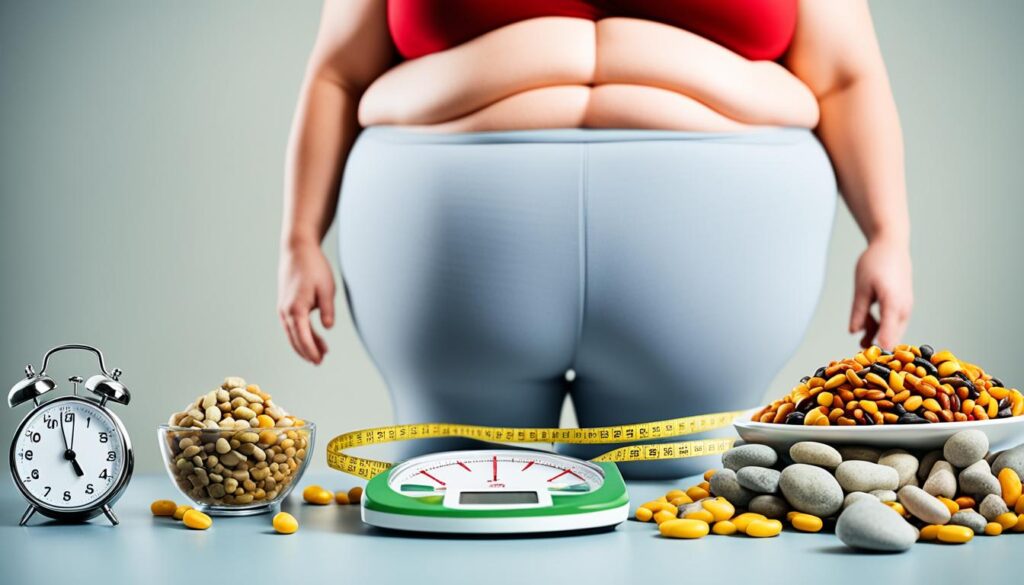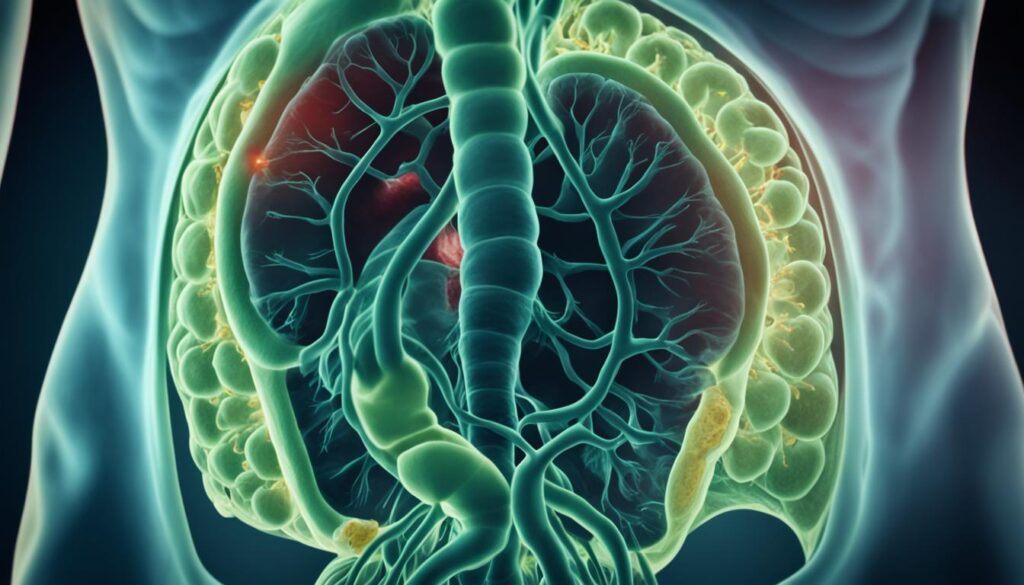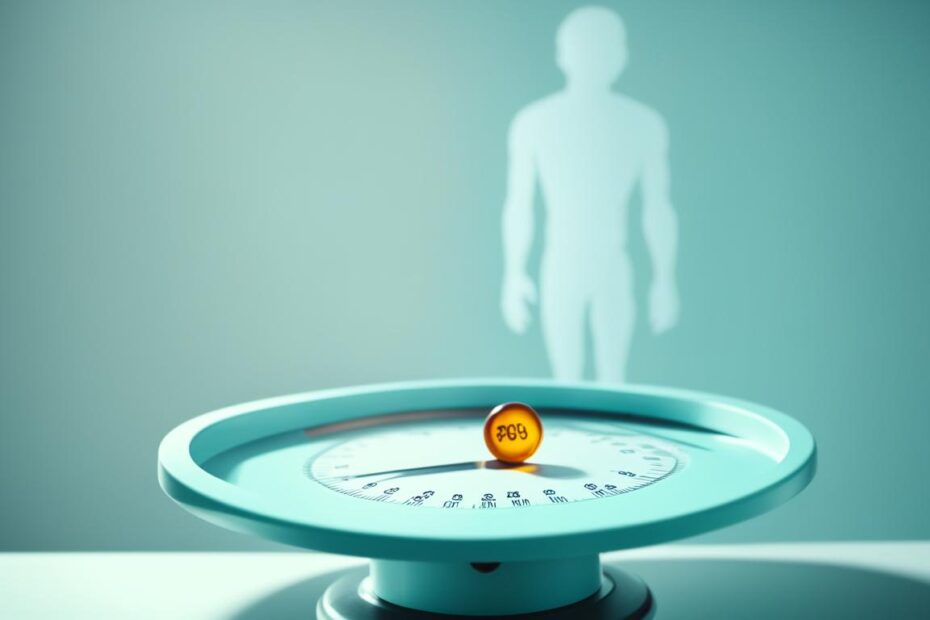Weight loss is a big deal today. Many are trying to shed pounds. But, there’s a catch. Losing weight can cause gallstones. So, be extra careful when you’re trying to get fit.
Being very overweight raises your gallstone risk, mainly if you’re a woman. Surprisingly, losing weight quickly can make gallstones more likely. It seems unfair, right? We try to be healthy, and our bodies act up.
This article will look into weight loss and gallstones. We’ll figure out why this happens. And, of course, I’ll give some tips on what to do. Are you ready to learn more about your body?
What Are Gallstones and How Do They Form?
Gallstones are like tiny rocks that can cause big problems in the body. They form in the gallbladder. Many people have this health issue.
Definition of gallstones
Gallstones look like small stones and make it hard for the body to work right. They can be as small as sand or as big as a golf ball. These ‘stones’ can block tubes and hurt a lot.
Composition of gallstones
Cholesterol gallstones are a common type. They form when there’s too much cholesterol in the bile. Bile breaks down the food we eat. Sometimes, too much cholesterol makes stones.
Factors contributing to gallstone formation
Things like being very overweight or losing a lot of weight quickly can make gallstones more likely. Changes in hormones and some illnesses also play a part. Knowing about these things can help us avoid gallstones. This means living healthy and eating well.
The Connection Between Weight and Gallstone Risk
Obesity is closely linked to gallbladder issues. Extra weight can raise cholesterol in the bile. This increases the chance of getting gallstones. If you carry a lot of fat around your waist, the risk is even higher.
Losing and gaining weight often can also cause problems. The more drastic the changes, the more you risk gallstones. Losing weight too fast, like more than 3 pounds each week, can mess up your bile balance, leading to gallstones.

To lower your gallstone risk when losing weight, go slow. Aim to drop 5-10% of your starting weight over six months. Do this with regular exercise, like 150 minutes of moderate workout weekly.
- Lose weight slowly (½ to 2 lbs per week)
- Maintain a balanced diet
- Stay physically active
- Avoid extremely low-fat diets
- Get adequate sleep
Keeping to these steps helps you lose weight safely. It also cuts your chances of getting gallbladder disease.
Can Weight Loss Cause Gallstones?
Weight loss has its ups and downs when it comes to gallstones, I’ve noticed. Certain ways of losing weight may up the chances of getting these painful stones.
The impact of rapid weight loss
Losing weight quickly can raise the risk of gallstones. When I lose weight fast, my liver puts more cholesterol in my bile. This extra cholesterol can turn into stones. Plus, my gallbladder might not work right during rapid weight loss, making things even riskier.
Weight loss surgery and gallstone formation
Bariatric surgery can help you drop the pounds, but it has its dangers, too. I’ve heard that one possible issue with the surgery is a higher chance of getting gallstones. After these surgeries, big changes in your weight can mess up your bile’s balance.
Very low-calorie diets and gallstone risk
Thinking about a low-calorie diet to lose weight quickly? It might not be the best idea. Cutting a lot of calories can lead to fast weight loss. This quick change can make forming gallstones more likely. Eating fewer than 800 calories daily is very risky.
- Gradual weight loss (1-2 pounds per week) is safer
- Balanced diets help maintain proper bile composition
- Regular meals support normal gallbladder function
Knowing the dangers can guide me in making smart choices for my weight loss. It’s important to think about both the pluses of losing weight and the risk of gallstones.
Symptoms and Complications of Gallstones
Gallbladder disease can slip by without you knowing, until it makes you hurt. After eating fatty foods, you might feel pain. These gallstones, which can be as small as sand or as large as golf balls, are the cause.
Signs of gallstones include:
- Sharp pain in the upper right abdomen
- Back pain between shoulder blades
- Nausea and vomiting
- Fever and chills
- Yellowing of skin (jaundice)

Surprisingly, 90% of gallstones don’t cause problems. But for some, it’s really tough when they do. Complications can be bad news. A blocked bile duct might cause serious infections in your bile ducts, pancreas, or liver.
Women are more likely than men to get gallstones. Also, Native Americans and people of Mexican descent face a greater risk. Losing weight fast can make gallstones more likely by putting extra cholesterol in your bile.
If your belly keeps hurting, it’s key to see a doctor. Detecting and treating gallbladder issues early can stop bad complications and make your life better.
Risk Factors for Developing Gallstones During Weight Loss
Some things make you more likely to get gallstones when you lose weight. It’s key to know these risk factors if you’re looking at surgery or a diet.
Pre-existing Gallstones
If you’ve ever had gallstones, the risk goes up when you lose weight. This is especially if you had pain or other signs before. Always share your health history with your doctor first.
Amount of Excess Weight
Starting off with a lot of extra weight means a bigger chance of gallstones. This explains why people getting obesity surgery need to watch out for gallstones.
Speed of Weight Loss
Losing weight too fast can be bad for your gallbladder. Dropping over 3 pounds a week boosts your gallstone risk. Slow and steady weight loss is better for your health.
Other factors that may increase your risk include:
- Being female
- Being over 60 years old
- Having a family history of gallstones
Know these risks to make a safer weight loss plan. Working with your doctor, you can cut the gallstone danger while still losing weight.
Safe Weight Loss Strategies to Minimize Gallstone Risk
Losing weight the right way can cut down the risk of gallstones. It’s best to lose weight slowly instead of quickly. Try to shed 1/2 to 2 pounds every week. This way, your body copes better and keeps bile healthy.
Don’t forget to add some fats when on a low-calorie diet. Diets very low in fat might up your gallstone chance. A diet balance is key for a happy gallbladder.
Get moving to lose weight safely and maybe dodge gallstones. I shoot for 150 minutes of exercise that gets my heart pumping. It’s good for losing weight and staying healthy.
- Avoid crash diets and very low-fat diets
- Aim for 1/2 to 2 pounds of weight loss per week
- Include some fat in your diet for gallbladder health
- Exercise regularly, targeting 150 minutes per week
For a weight loss plan that also cuts gallstone risk, ask a pro. Talking to a doc or a dietitian is a smart move. They can set up a special plan just for you, fitting your health and needs.
Medical Interventions for Preventing Gallstones During Weight Loss
I learned that after obesity surgery, patients might get gallstones more often. It’s a known risk of the surgery. Doctors suggest ways to prevent this.
One way to help is by taking medicine. A drug called ursodiol is often given to patients after surgery. It stops gallstones by:
- Lowering how much cholesterol is made
- Helping bile move better
- Breaking down small stones that are already there
For people at higher risk, it’s vital to keep an eye out. Doctors might do ultrasound tests often. They check for new gallstones when you’re losing weight fast. This is very true for anyone who had gallstones before or has other risks.
If you’re thinking about obesity surgery, talk to your doctor about these steps. They can make a special plan to lower your chance of getting gallstones. Remember, taking action early can really help prevent problems later.
Before you start losing weight, make sure to see a doctor first. This is especially true if you might get gallstones. They’ll show you the best, safest way to lose weight and stay healthy.
Long-Term Health Benefits of Maintaining a Healthy Weight
Keeping a healthy weight is very important for our well-being over time. Being very overweight makes gallbladder disease three times more likely. But, keeping our weight stable can cut down this risk and others.
Going up and down in weight, or yo-yo dieting, can hurt us. A study said women who changed weight by 10-19 pounds up and down had more risk. If their weight changed by 20 pounds or more, their risk increased a lot. Keeping our weight steady can help avoid gallbladder troubles.
Having the right weight is good for more than just our gallbladder. Those who exercise a lot have a 25% lower chance of gallbladder disease. Also, eating nuts often can lower the risk for women needing gallbladder surgery by 25%. Making changes in how we live can make us healthier and lessen risks from being overweight.
